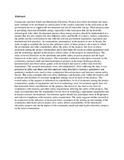| dc.description.abstract | Community operated Small and Mini-hydro Electricity Projects have been developed and many more continue to be developed in various parts of the country especially in the rural areas as the government moves to support the development and use of renewable energy. These projects aims at providing clean and affordable energy especially to the rural areas that are far from the national grid. Like other development projects these energy projects should be implemented in a manner that not only ensures but also enhances safety and health of workers, visitors, consumers, the public and the environment in line with the relevant government legislation, regulation and international best practices.
As communities' participation in the projects is new in Kenya, the study sought to establish the factors that influence safety of these projects; the extent to which the government and other stakeholders affect the safety of the projects, the level of safety awareness among the project communities and to determine the extent to which equipments used and the technology applied in the projects affects safety of the projects in central Kenya. The study reviewed literature on the operations and public safety in power projects and the legal framework on the safety of the projects.
The researcher conducted a descriptive research on the community operated small and mini-hydropower projects in the larger Kirinyaga district. Questionnaires and observations guides were developed and used to collect data from the respondents. The research instruments were, self administered. After collecting the data, it was presented in tables and charts and then analyzed using descriptive statistics; quantitative and qualitative methods were used to draw comparison between projects and between various safety factors. The study concludes that real safety challenges and hazards exist within the projects and accidents and incidents of customer equipment damage occur in many of the projects.
The overall safety of the projects is influenced by stakeholders, level of awareness among the project communities, quality of equipments and level of technology used. Government agents have not had noticeable direct contributions on the projects; this however, has lead to low level of compliance with statutory and other safety requirements affecting the safety of the projects. The study recommended that the stakeholders invest more in technology, appropriate equipments and in human resource development. Government agents should also participate more in the projects and enforce compliance with statutory safety requirement. The study suggests further research to be conducted on the influence of increased safety awareness in the setting-up and running of the community mini-hydro power project; how safety affects sustainability of the mini-hydro electricity projects and on the impact of the community small and mini hydro-electricity projects on the local communities. | en_US |

